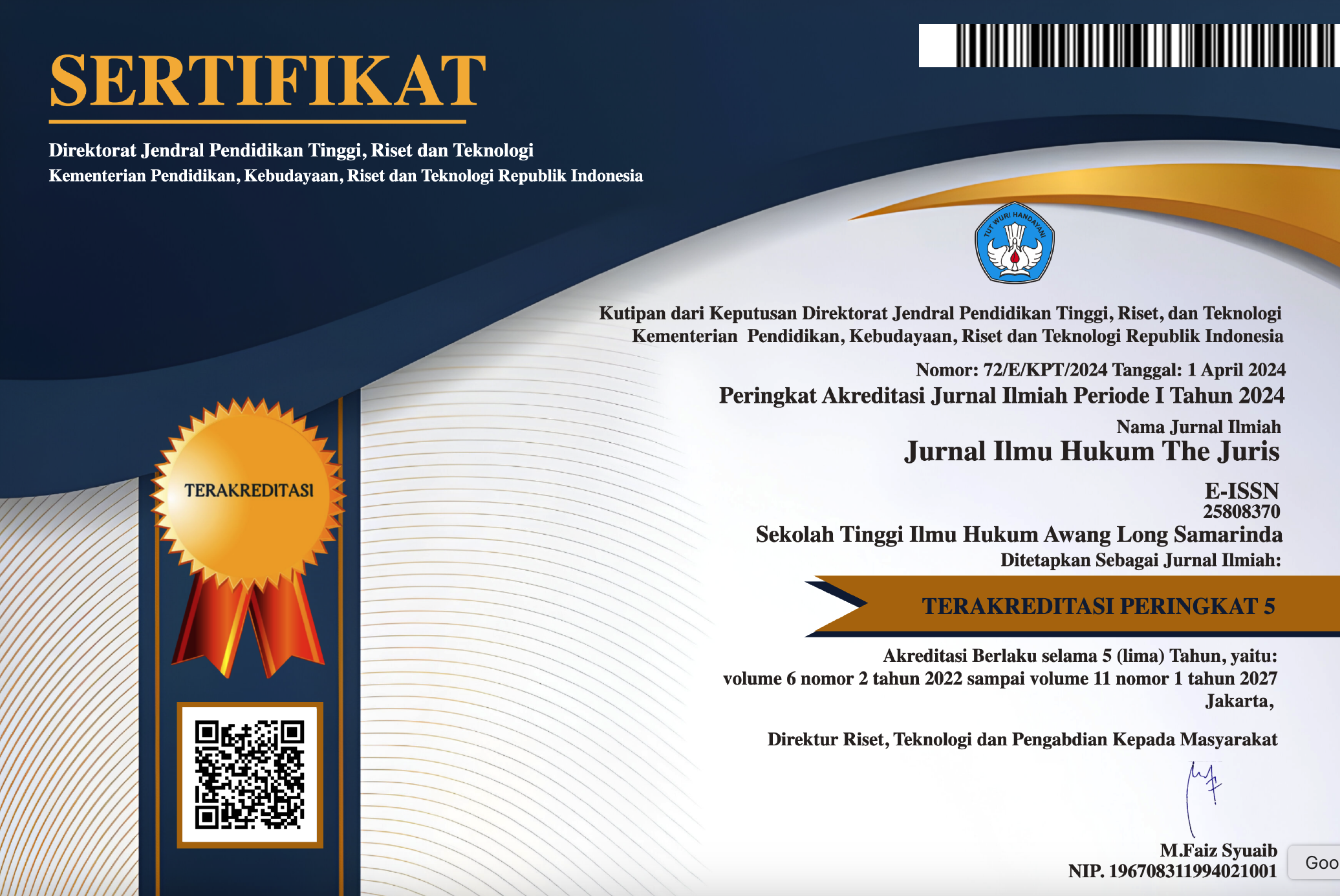ANALISIS KEBIJAKAN NEGARA DALAM TATA KELOLA E-GOVERNMENT
Abstract
Analyzing national policy in e-government governance is crucial given the rapid development of digital technology, which demands efficiency and transparency in government. The transformation towards e-government aims to improve public services, civic participation, and government accountability through the utilization of information technology. However, its implementation often faces challenges such as infrastructure gaps, human resource capacity, and regulatory harmonization. This journal aims to analyze national policy in e-government governance from a governmental perspective, focusing on policy effectiveness, system integration, and its impact on administrative performance. This research employs a qualitative approach through literature review and analysis of policy documents from various countries, including Indonesia, as well as interviews with relevant stakeholders. Data was collected from official government sources, international reports, and academic journals to ensure the validity of the findings. The research results indicate that the success of e-government governance largely depends on political commitment, the availability of technological infrastructure, and the training of civil servants. Countries with integrated and adaptive policies tend to achieve higher efficiency in public services compared to those that adopt a partial approach. In Indonesia, despite significant progress in government digitalization, challenges such as disparity in internet access and inter-agency coordination remain major obstacles. This journal concludes that strengthening regulations, investing in infrastructure, and improving digital literacy are strategic steps to optimize e-government governance. The recommendations provided include the formulation of an inclusive and sustainable national framework to support the digital transformation of government.
Downloads
References
APJII (Asosiasi Penyelenggara Jasa Internet Indonesia). (2023). Survei Penetrasi dan Perilaku Pengguna Internet Indonesia 2023. apjii.or.id.
Badan Pusat Statistik Indonesia. (2023). Statistik Telekomunikasi Indonesia 2023. bps.go.id.
Badan Siber dan Sandi Negara (BSSN). (2022). Laporan Ancaman Siber 2022. bssn.go.id.
CNN Indonesia. (20 Mei 2021). Kebocoran Data BPJS Kesehatan 2021. cnnindonesia.com.
Creswell, J.W. (2013). Qualitative Inquiry and Research Design. SAGE Publications.
Dinas Kominfo Kabupaten Jayapura. (2023). Evaluasi Akses Digital 2023. jayapura.go.id.
DISKOMINFO Kota Bogor. (2022). Tahapan E-Government. kominfo.kotabogor.go.id.
e-Estonia Initiative. X-Road: The Backbone of Digital Estonia. https://e-estonia.com/solutions.
Government of Vietnam. (2015). Resolution 36a/NQ-CP on E-Government.
Heeks, R. (2006). Implementing and Managing eGovernment. SAGE Publications.
Indrajit, R.E. (2007). E-Government: Strategi dan Implementasi. Jakarta: Penerbit Andi.
Instruksi Presiden Republik Indonesia No. 3 Tahun 2003. Kebijakan dan Strategi Nasional Pengembangan E-Government.
Jurnal Terapan Pemerintahan Minangkabau. (2024). Tantangan dan Solusi Penerapan E-Government di Indonesia.
Kementerian Investasi/BKPM. (2022). Laporan Kinerja OSS 2022. bkpm.go.id.
Kementerian Keuangan. (2023). APBN 2023: Postur Anggaran TIK. kemenkeu.go.id.
Kementerian Komunikasi dan Informatika. (2021). Laporan Koordinasi SPBE 2021. kominfo.go.id.
Kementerian Komunikasi dan Informatika. (2022). Laporan Progres Palapa Ring. kominfo.go.id.
Kementerian Komunikasi dan Informatika. Peran Kominfo dalam E-Government. www.kominfo.go.id.
Kementerian PAN-RB. (2022). Evaluasi SPBE 2022. menpan.go.id.
Kementerian PAN-RB. (2022). Laporan Pelatihan ASN 2022. menpan.go.id.
Kementerian Sekretariat Negara. (2018). E-Government: Inovasi dalam Strategi Komunikasi.
Kim, S. (2016). Government 3.0 in Korea: Openness and Innovation. Public Administration Review.
Kim, S. (2016). Korea’s Digital Government Success. Public Administration Review.
Komisi Pemberantasan Korupsi (KPK). (2021). Evaluasi Tata Kelola SPBE. kpk.go.id.
Komisi Pemberantasan Korupsi (KPK). (2022). Laporan Pencegahan Korupsi 2019-2022. kpk.go.id.
KSP (Kantor Staf Presiden) dan KemenPAN-RB. (2023). Laporan Kinerja Lapor! 2023. lapor.go.id.
Lembaga Administrasi Negara (LAN). (2022). Studi Kepatuhan SPBE 2022. lan.go.id.
Malaysian Administrative Modernisation and Management Planning Unit. (2020). MyGovUC Overview.
Moon, M.J. (2002). The Evolution of E-Government among Municipalities. Public Administration Review.
Nugroho, Y. (2023). Fragmentasi Data dalam E-Government Indonesia. Jurnal Administrasi Publik.
OECD. (2020). Digital Government in Developing Countries.
OECD. (2020). Digital Government Review: Estonia. oecd.org.
OECD. (2020). Digital Government Skills Framework.
OECD. (2021). Digital Government Strategies.
Open Government Indonesia. (2021). Laporan Transparansi Digital 2021. ogi.go.id.
Pemerintah Kota Surabaya. (2022). Laporan Kepuasan Publik e-Musrenbang. surabaya.go.id.
Pemerintah Provinsi Jawa Barat. (2022). SAPAWARGA: Inovasi Pelayanan Publik. jabarprov.go.id.
Peraturan Menteri PAN-RB No. 59 Tahun 2020. Pemantauan dan Evaluasi SPBE.
Peraturan Presiden No. 95 Tahun 2018. Sistem Pemerintahan Berbasis Elektronik.
Pratama, A. (2021). Evaluasi Infrastruktur TIK untuk E-Government. Jurnal Teknologi Informasi.
Singapore Public Service Division. (2021). Digital Transformation Strategy.
Smart Nation Singapore. Public Engagement in Digital Governance. smartnation.gov.sg.
Smart Nation Singapore. SingPass: Digital Identity for All. https://www.smartnation.gov.sg.
Susanti, R. (2022). Literasi Digital dan Adopsi E-Government. Jurnal Ilmu Pemerintahan.
Thailand Digital Government Agency. (2021). Thailand 4.0 and GSS. https://dga.or.th.
Transparency International. (2021). Cybersecurity and Public Trust in Digital Governance.
UN DESA. (2022). E-Government Development Index 2022. https://publicadministration.un.org.
Undang-Undang No. 27 Tahun 2022. Perlindungan Data Pribadi. dpr.go.id.
UNDP. (2020). Support for E-Government Development in Indonesia.
United Nations. (2022). E-Government Survey 2022. https://publicadministration.un.org/egovkb/en-us/Reports/UN-E-Government-Survey-2022.
Universitas Airlangga. (2023). Komparasi E-Government di Lima Daerah pada Saat Pandemi Covid-19.
Vassil, K. (2015). Estonian E-Government Ecosystem. Tallinn University of Technology.
Weerakkody et al. (2011). Challenges of E-Government in Developing Countries.
World Bank. (2021). Indonesia Digital Economy Report.
World Bank. (2022). Digital Development in Southeast Asia.
Copyright (c) 2025 Isak Samuel Kijne Mansawan, Hengky Saiba

This work is licensed under a Creative Commons Attribution-ShareAlike 4.0 International License.







